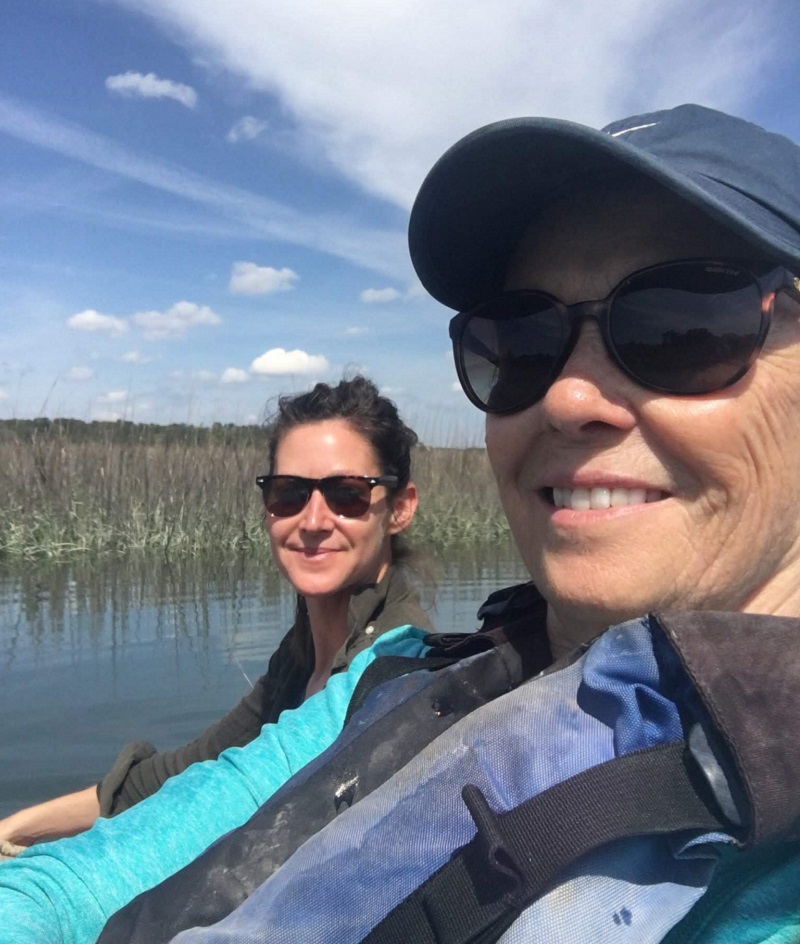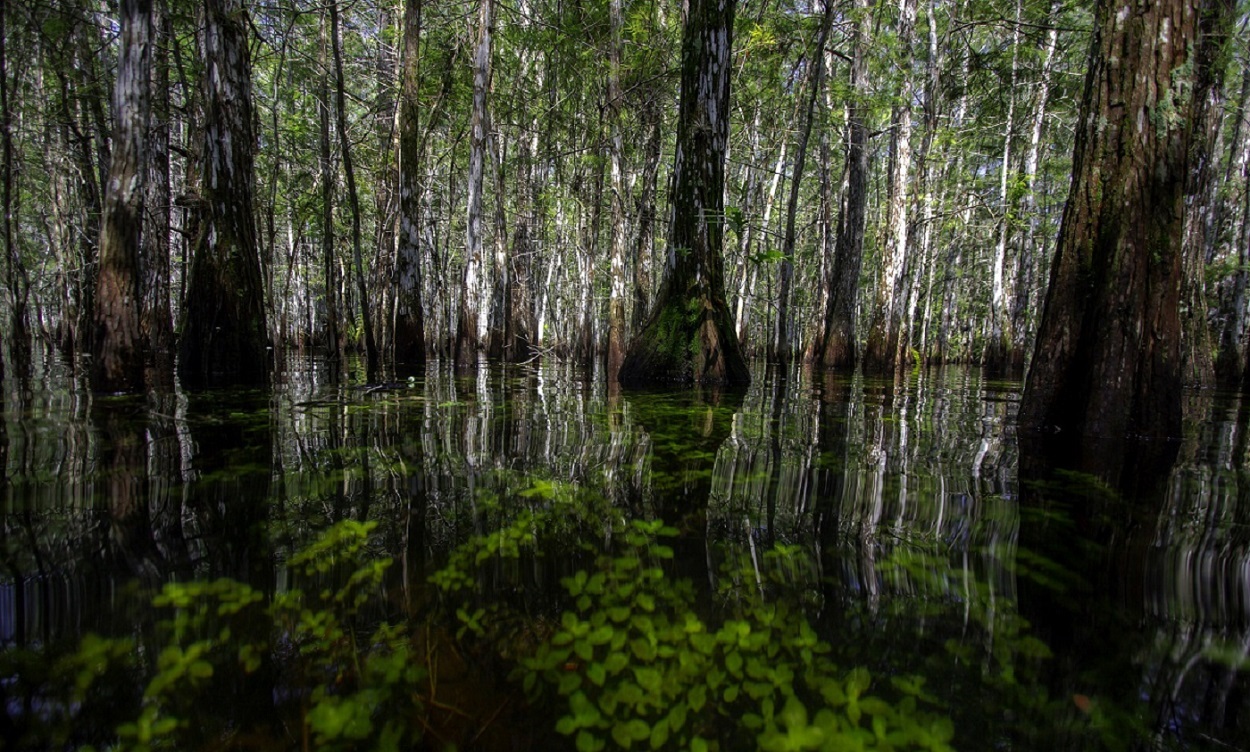South Florida’s Biscayne aquifer is the primary source of drinking water for more than six million Sunshine State residents. Due to its surface proximity, the aquifer interacts with rainwater and other bodies of water, making it vulnerable to surface contaminants. So it would be really sensible to drill for oil in the Everglades, a recharge zone for the aquifer, right? Wrong!!
That’s the argument that local activists and elected officials have been making since July 2015, when Kanter Real Estate LLC applied for a permit for exploratory drilling on some of the 20,000 acres it owns in the Everglades. It’s located in a Water Conservation Area being restored under the Comprehensive Everglades Restoration Plan, passed by the US Congress in 2000 and still in effect.
Diana Umpierre is the Sierra Club’s organizing representative for the Everglades Restoration Campaign, a part of the Our Wild America program. Stationed in the Belle Glade field office of the Club’s Florida Chapter, she works to advance restoration and oppose threats such as the Kanter deal.
“There’s been a lot of restoration work in the area over several decades,” Umpierre says. Not only do these waters recharge the aquifer, some flow into Everglades National Park. If there’s a spill—and we know from past events it can happen—it would be a disaster…so why take the risk?”
The Florida Department of Environmental Protection (FDEP) twice denied the Kanter permit request, in November 2016 and November 2017; Kanter appealed both decisions. On February 5 of this year the Florida 1st District Court of Appeals ruled in favor of the company, essentially ordering the FDEP to issue the permit. FDEP countered by requesting that the case be either reheard or declared one of “great public importance,” which could force the issue to the Florida State Supreme Court.
It was against this backdrop that on February 19 a group of stakeholders gathered at Everglades Holiday Park to emphasize their ongoing objection to any local drilling. In a state that remained stubbornly (if narrowly, in several key instances) red in the 2018 midterm elections, numerous local county and city officials have been vocal in their opposition from the get-go, largely due to the threat to their constituents’ drinking water. Umpierre emceed the press conference where local elected officials, including a city commissioner representing the Latino community, took the mic along with speakers from Food and Water Watch and South Florida Wildlands Association.
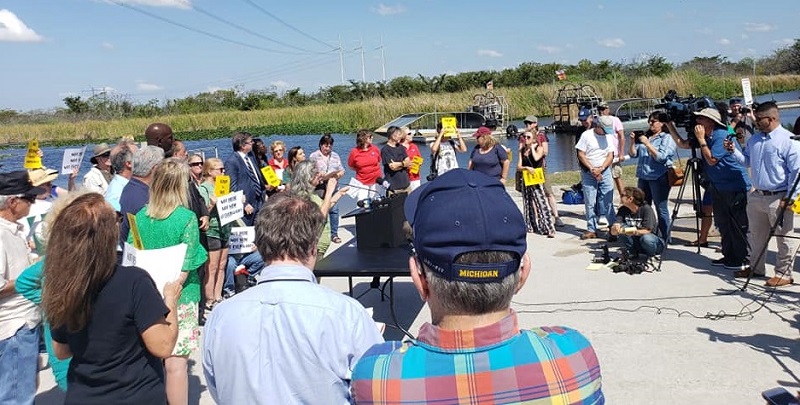
Press conference and rally against the proposed Kanter drilling permit. Photo courtesy of Maria Hernandez.
The environmental organizations emphasize there’s more at stake than clean drinking water. “We look at this from the standpoint of the aquifer threat, but are also concerned about wildlife impacts—there are endangered species here. It also impacts current and future restoration work,” says Umpierre.
Among the Sierra Club activists who rallied at the press conference was Sue Caruso. A retired high school science teacher, she and her husband Bill moved to Florida 41 years ago from Schenectady, NY. “We got out of Dodge and headed to warmer weather,” she says. They enjoyed Club outings, but with three adult children and five grandkids, Caruso’s viewpoint broadened. “After being here long enough to feel like a native, I began wanting to help turn the tide on such things as development,” she says. “My grandkids mean a lot to me, and I care about leaving a better place for them.”
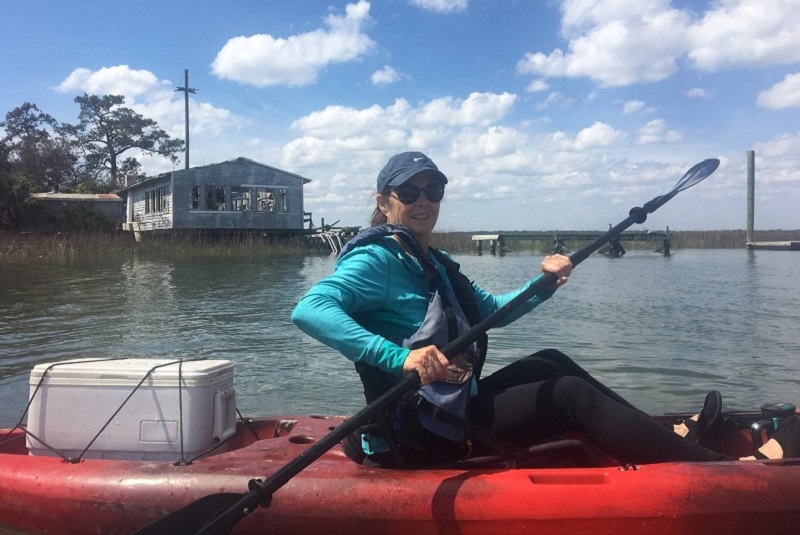
Caruso kayaking in the coastal salt marsh in Savannah, Georgia. Photo courtesy of Sue Caruso.
Caruso has been volunteering for the Club since 2012, when she helped to successfully deter a fracking proposal, and currently serves as chair of the state chapter’s Conservation & Growth Management subcommittee. She’s been active in Umpierre’s campaign to align as many local leaders and legislators as possible against the Kanter permit, and recalls something she learned about the Kanter Family Foundation while conducting research.
“They proudly cosponsored a health summit that sought to improve outcomes and spending in the healthcare system—how can you look at that issue as separate from what you want to do here, when crude oil has carcinogens in it? I’m not sure how possible contamination of the Everglades and our drinking water when a spill happens isn’t a connection they’re able to make,” she says. “The money is more important to them than the health risks.”
Also on February 19, a letter signed by 72 partner and ally organizations was sent by the Sierra Club to newly elected Governor Ron DeSantis, reminding him of his stated support for Everglades restoration and his opposition to drilling and fracking. It also urged DeSantis to work with FDEP and the state legislature to adopt measures forbidding future exploration or drilling in the Everglades.
The letter was a Club initiative, with wordsmithing input from other participants. “We started gathering signatures on a Thursday evening and the letter went out the following Tuesday morning,” Umpierre says. “With more time, we would’ve had even more signers.”
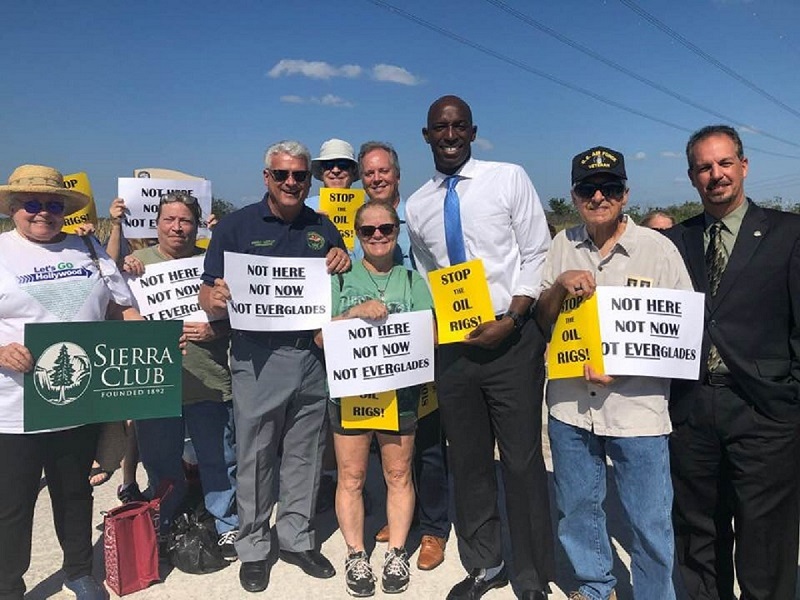
Activists and elected officials at the February 19 rally. Photo courtesy of Angel Castillo.
Regretfully, on March 19 the appeals court denied FDEP’s motion, leaving the future well-being of this conservation area up in the air. It was understood all along that the Kanter permit might be granted—which now seems imminent. “The issuance of a permit doesn’t end the fight for the Sierra Club or state and local leaders,” Umpierre says. “There are additional permit and rezoning requirements to address. We know it’s going to be a long fight.”
Driving that will be the acknowledgement that if oil is found, the threat increases. “It might escalate to a large industrial site, since Kanter owns 20,000 acres,” says Umpierre. “And other people could own mineral rights there, creating a domino effect.”
The Sierra Club and its allies continue to work with local leaders who are committed to a clean energy future while persisting in the fight against the dirty energy present, as symbolized by Kanter. Unsurprisingly that mindset extends to the Club’s volunteers, and Caruso cites as her inspiration a quote from the 1971 Dr. Seuss classic, The Lorax: “Unless someone like you cares a whole awful lot, nothing is going to get better. It’s not.”
Amen to that, sister!
